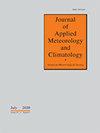基于长期高分辨率WRF模拟的爱达荷中部山区降雪累积驱动因素
IF 2.2
3区 地球科学
Q3 METEOROLOGY & ATMOSPHERIC SCIENCES
引用次数: 0
摘要
美国西部是一个经济和农业强国,高度依赖来自西部山区的冬季积雪。再加上对水和可再生电力需求的增加,积雪资源在气候变化中的可预测性和可行性变得越来越重要。特别是在爱达荷州,该州高达75%的电力生产来自水力发电,这取决于春季融雪的时间和数量。虽然我们从SNOTEL观测得知4月1日的积雪正在减少,并且预计从GCM预测中还会继续减少,但我们在区域水平上了解积雪积累和分布的变率的能力却不太可靠。在本文中,我们使用0.9 km分辨率WRF模拟来分析降雪事件,以了解2016年10月1日至2017年4月31日期间爱达荷州山区降雪积累和分布的变化。评估了整个季节降雪事件的各种特征,包括空间覆盖、事件持续时间和降雪率,以及云微物理变量(特别是液体和冰水含量)与降雪量之间的关系。我们的研究结果表明,有效的降雪条件——例如:在美国,高水平的过冷液态水在整个冬季都可能存在,但当地表温度接近或低于冰点时,影响更大。低效率降雪量很常见,超过全年降雪量的50%,其中一些发生在冬季高峰。对于这类事件,冰川期人工降雨可能对该地区积雪的发展和生存能力产生重大影响。本文章由计算机程序翻译,如有差异,请以英文原文为准。
Drivers of Snowfall Accumulation in the Central Idaho Mountains using Long-Term High-Resolution WRF Simulations
The Western United States, an economic and agricultural powerhouse, is highly dependent on winter snowpack from the Mountain West. Coupled with increasing water and renewable electricity demands, the predictability and viability of snowpack resources in a changing climate is becoming increasingly important. In Idaho, specifically, up to 75% of the state’s electricity production comes from hydropower, which is dependent on the timing and volume of Spring snowmelt. While we know that April 1 snowpack is declining from SNOTEL observations and is expected to continue to decline from GCM predictions, our ability to understand the variability of snowfall accumulation and distribution at the regional level is less robust. In this paper, we analyze snowfall events using 0.9 km-resolution WRF simulations to understand the variability of snowfall accumulation and distribution in the mountains of Idaho between 1 October 2016 – 31 April 2017. Various characteristics of snowfall events throughout the season are evaluated, including the spatial coverage, event durations and snowfall rates, and the relationship between cloud microphysical variables—particularly liquid and ice water content—on snowfall amounts. Our findings suggest that efficient snowfall conditions—e.g., higher levels of elevated supercooled liquid water—can exist throughout the winter season but are more impactful when surface temperatures are near or below freezing. Inefficient snowfall events are common, exceeding 50% of the total snowfall events for the year, with some of those occurring in peak winter. For such events, glaciogenic cloud-seeding could make a significant impact on snowpack development and viability in the region.
求助全文
通过发布文献求助,成功后即可免费获取论文全文。
去求助
来源期刊
CiteScore
5.10
自引率
6.70%
发文量
97
审稿时长
3 months
期刊介绍:
The Journal of Applied Meteorology and Climatology (JAMC) (ISSN: 1558-8424; eISSN: 1558-8432) publishes applied research on meteorology and climatology. Examples of meteorological research include topics such as weather modification, satellite meteorology, radar meteorology, boundary layer processes, physical meteorology, air pollution meteorology (including dispersion and chemical processes), agricultural and forest meteorology, mountain meteorology, and applied meteorological numerical models. Examples of climatological research include the use of climate information in impact assessments, dynamical and statistical downscaling, seasonal climate forecast applications and verification, climate risk and vulnerability, development of climate monitoring tools, and urban and local climates.

 求助内容:
求助内容: 应助结果提醒方式:
应助结果提醒方式:


